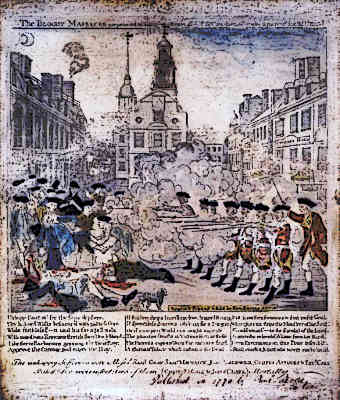Boston Massacre
What was the background of the Boston Massacre
In 1770, the American colonies were not on friendly terms with Britain. In the previous years, Britain had tried to impose new taxes and exert authority over the colonies. The Americans disliked these actions and protested against them, forcing Britain to take back some of the taxes.
In 1768, British Parliament imposed a new tax called the Townshend Acts. This imposed additional tax on goods imported from Britain to American colonies. Boston was a shipping town, so it was directly affected by the tax. Bostonians protested against the tax and an anti-British sentiment became strong in Boston.

British military arrives in Boston
The British governors and officials had to face strong resistance in Boston. They asked the British military to help them. As a result, British warship called HMS Romney with 50 guns arrived in Boston. The warship seized one of the Boston merchant ships which fueled further anti-British rioting in the town.
Two proper regiments of British army then arrived in Boston in 1768 to control the situation. The Americans saw this as an aggressive act and confrontations between British soldiers and the Americans began to take place. This culminated in the Boston massacre incident which took place in 1770.
What was the Boston Massacre
A British soldier stood guard outsider the Custom house in Boston on March 5, 1770. One of the passerby hurled an insult on the soldier. After an argument, the soldier struck the passerby on the head with his musket. This prompted another passersby to stop and begin arguing with the soldier.
By evening, 50 people had gathered around the soldier. He sought assistance from a nearby garrison. One officer and six British soldiers arrived at the scene to help the besieged soldier. By this time, a crowd of nearly 400 had gathered around the British soldiers.
Many in the crowd threw snowballs and other objects at the soldiers, trying to provoke them. One of the thrown objects struck a soldier and knocked him down. He got up on his feet and opened fire on the crowd. The other soldiers also opened fire which caused the death of 5 people and injured many other’s.
What happened after the Boston Massacre
The 29th Regiment of British Army arrived at the scene while the crowd moved away. Bostonian politicians demanded that Governor Thomas Hutchinson, appointed by Britain, remove the troops. The troops were removed soon afterwards, first to Castle Island and then out of the province.
On March 27, the soldiers and the civilians involved in firing were indicted for murder. Only two of the soldiers were found guilty of manslaughter while the court decided that the rest were simply defending themselves against a dangerous crowd. All the four civilians brought to trial were also acquitted. The two soldiers found guilty had their thumbs branded in open court.
What was the impact of Boston Massacre
The Boston Massacre worsened the relationship between the American colonies and British administration. A huge number of Bostonians attended the funerals of the civilians who died in the massacre.
Newspapers and pamphlets fiercely criticized the British soldiers involved and used the incident for propaganda against British administration. The incident contributed significantly towards the American Revolution which began in 1765.
